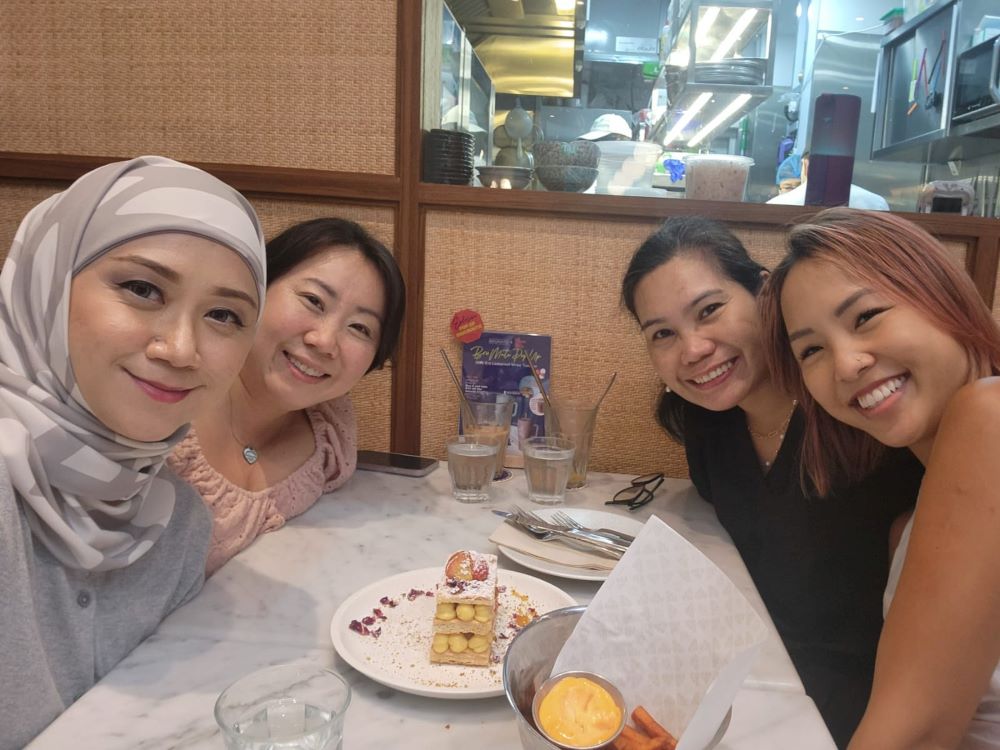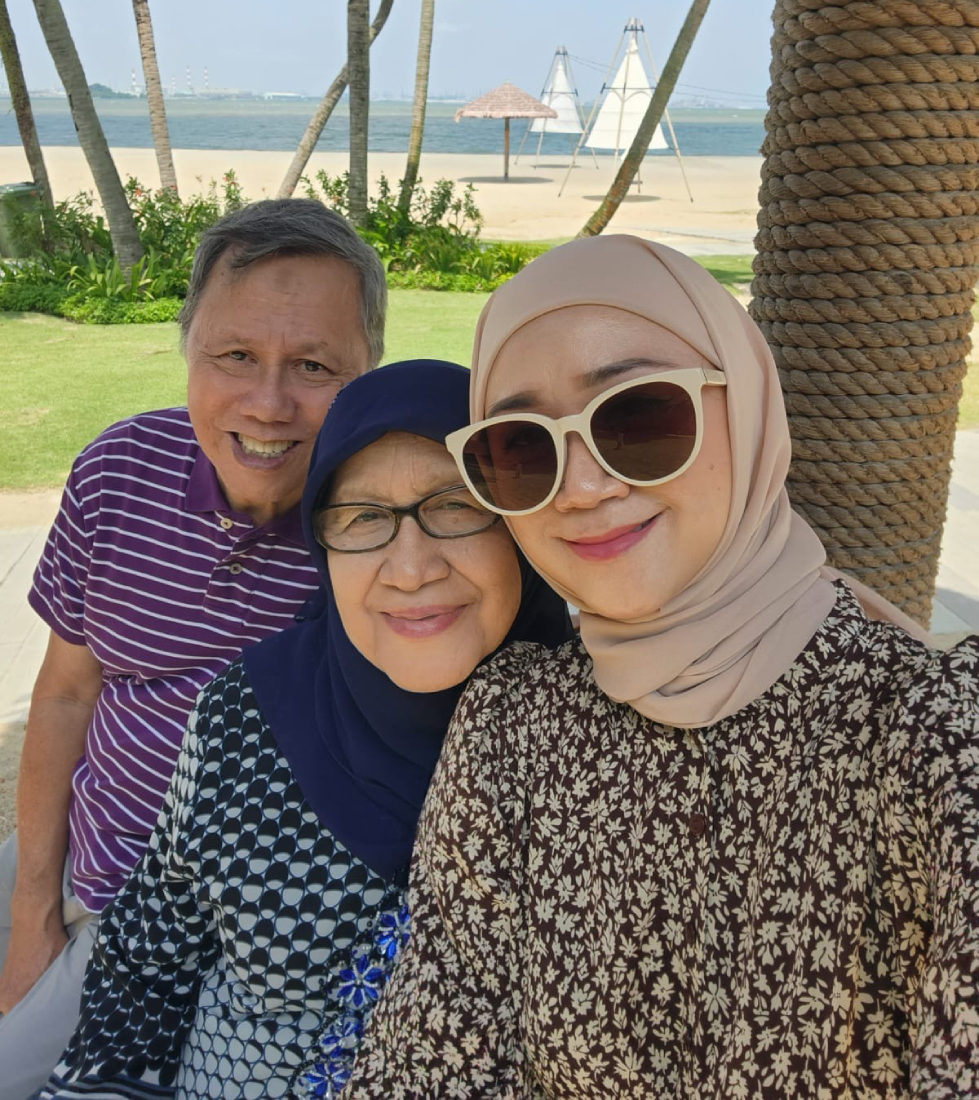'I try not to think about myself': Woman battles breast cancer while caring for mum who has gall bladder cancer


To mark Breast Cancer Awareness Month, we speak to inspiring Singaporeans about their journey in battling and overcoming cancer.
Warda Ismail gets anxious about things easily, especially when it comes to her health.
So much so that her doctor once told her that she is a "borderline hypochondriac", she shared with AsiaOne in an interview.
For the uninitiated, hypochondria is a condition where a person is excessively and unduly worried about having a serious illness.
To keep her mind at ease, the 44-year-old preschool educator has the habit of going for regular medical checkups.
Though she was vigilant, her worst nightmare came true — she was diagnosed with breast cancer on May 8 this year.
And in the midst of her recovery journey, she got more terrible news — her mother, who had been caring for her, was diagnosed with stage-three gall bladder cancer.
Despite the string of unfortunate events, Warda persevered and tried to have a more positive outlook on life and her health.
Since young, Warda has had naturally lumpy breast tissue.
This made her worry, so she would monitor changes in her breasts, do breast self-exams, and go for yearly breast ultrasounds at Singapore General Hospital (SGH).
"Whenever I get body changes that are not normal to me, I will get it checked out," she told us.
When she noticed that her left nipple was producing a clear, watery discharge in July 2023, she became extremely concerned and booked a mammogram appointment at SGH.
The results showed micro-calcifications (white dots) in both her breasts.
After which, Warda was scheduled for a follow-up mammogram in the next six months.
However, in November 2023, she noticed that the discharge from her left nipple had turned yellowish-brown. So, she made an appointment to see her doctor.
She was advised to monitor the colour of the discharge and seek immediate medical attention if it turned red.
Things seemed to be fine for the next few months. Despite still experiencing discharge in her left nipple, Warda's follow-up mammogram result on March 5 was normal.
However, things took a turn in April when the discharge turned red.
Concerned, Warda made an appointment to see her doctor and on April 17, an ultrasound revealed a new nodule in her left breast milk duct.
She was scheduled for a biopsy on April 29 and the only person she told was her father as she did not want to alarm her mother.
"I had already begun to prepare myself for bad news because I am over anxious and an overthinker," she said.
"My rationale is that if I'm already prepared for the bad news, when the bad news hits me, I'll be more ready."
But the news of being diagnosed with stage-one triple positive breast cancer in her left breast still took a toll on her even though it didn't come as a shock.
"My whole body went cold [when I received the news]," she recounted.
Despite the bad news, Warda remained calm and strong.
"My immediate focus was trying to understand what could be done to tackle this problem."
Warda, who had gone to the doctor's appointment alone, immediately went home after to break the news to her family.
Naturally, they were shocked and devastated, especially since they did not have any history of cancer in their immediate family.
They did, however, take comfort in the fact that the cancer was in its early stages and still treatable.
Over the next few months, the family worked together to make Warda's life more comfortable.
"For instance, my dad's love language is through actions. After the day I was diagnosed, I would still go to work and he insisted on driving me there every day," Warda shared.
On the other hand, her mother would prepare her healthy meals so that she had the energy to recover, while her brother and sister-in-law would accompany her for her doctor's appointments.
"Having someone to accompany me during my sessions helps to take the anxiety away. It feels less overwhelming and I feel more comfortable," she said gratefully.
"I'm fortunate to have such a strong support system."
Others who have helped her during this difficult time are her two friends, who are also battling cancer.
"Asking them how it was for them, asking them for tips, how they managed their side effects, definitely helped me cope better," said Warda.
"When I talk to them, they understand me, they can relate."
Warda's doctor presented her with two treatment options – a lumpectomy or mastectomy.
For context, a lumpectomy is surgery to remove cancer from the breast, while a mastectomy is surgery to remove a breast.
After doing her own research and talking with a friend who underwent a mastectomy, she opted for the latter to reduce the risk of the cancer spreading to other areas in the breast.
On June 11, she underwent a mastectomy and breast reconstruction surgeries.
The 12-hour-long procedure also involved a fat graft from her abdomen to the left breast.
She joked that this could be seen as a positive.
"The upside of breast reconstruction is that they used my stomach tissue, so I essentially had a tummy tuck. That's a win," she told us with a chuckle.
Thankfully, Warda experienced minimal side effects from the surgeries such as slight pain, dizziness and the inability to lift her left arm.
[[nid:669920]]
She began physiotherapy two weeks after her surgeries and because of the aggressive nature of the cancer, she was advised by her doctor to undergo chemotherapy to reduce the risk of the cancer recurring or spreading.
She started the first of her 12 sessions on July 22 and experienced side effects like hair fall, pimples on her scalp and numbness in her fingers and toes.
Concurrently, she receives targeted therapy every three weeks and after she completes chemotherapy, she will be on oral hormonal therapy for seven years.
If she faced any issues with side effects, she would seek support from the National Cancer Centre Singapore (NCCS) Chemotherapy Helpline.
Despite being someone who gets anxious easily, Warda fought to overcome this instead of letting it swallow her up during this tough period.
"I knew my anxiety would raise my blood pressure and this would not be good for my chemotherapy sessions. So I tried my best to maintain a positive mindset, which I give myself credit for," she told us.
"It was challenging, but I forced myself to think of the upsides of chemotherapy."
To mentally prepare herself before each chemotherapy session, Warda would also ask the doctors and nurses attending to her about what to expect.
"Knowing what to expect while understanding the possible side effects that may emerge earlier or later on helps me console [myself]. It reduces my anxiety because I already know what is coming."
Another thing Warda does for herself, which she calls "trivial", is treating herself to nice things.

"Sometimes I would buy some new clothes and wear it for my chemotherapy sessions," she shared.
"It works for me. Because I want to wear it somewhere and it makes me feel like I'm going out to hang out with a friend."
She also likes to buy herself scones from the cafe at the NCCS before her chemotherapy sessions.
"I have a scone obsession now," she told us with a laugh.
Ever since Warda's diagnosis, her emotions have been all over the place.
"It was really a rollercoaster ride. From the initial shock of the diagnosis to the fear of what's to come, I found that sometimes it's hard to not feel this constant wave of emotions, it's up and down," she shared.
"Some days I feel okay, some days I feel overly worried. So there are better days, and there are some bad days and uncertainty. The uncertainty of the future is the hardest part. Because I'm sure all cancer patients will say that they worry about recurrence."
Unfortunately, while dealing with her diagnosis, Warda found herself having to worry about another matter— her mother was diagnosed with stage-three gall bladder cancer on Aug 28.
"It initially felt really surreal. I was just diagnosed with cancer in May, now it's my mum," Warda told us.
Before the diagnosis, the family already sensed that something was wrong with her mother's health and initially suspected that it was jaundice.
"We didn't expect it to be cancer. It took a while to fully process the news. Honestly, I'm still processing the news," Warda sombrely told us.
"I feel an overwhelming sense of fear and worry for her because she's elderly; she turns 70 next month."
Though as a cancer patient, Warda can in a way relate to her mother, it's still been hard.
"Me going through [cancer] myself is different, but to see someone you love face such a tough battle... I feel helpless. No matter what I want to do, I can't change her diagnosis," she said.
And now, Warda also takes on the responsibility of being her mother's caretaker. Whenever she is home, she would help her mother with her meals and medication.
"My mum used to be the main person who does the cooking. But since she got sick, I suddenly turned into a domestic goddess, which is a shock to everyone who knows me as I don't cook," Warda shared with a chuckle.

While caring for her mother, Warda herself still has to go for her own treatments, which can be taxing.
"I am very thankful and grateful that I can still function per normal. Just that on the day of chemotherapy, I will be more groggy and weak," she explained.
When this happens, she usually tries to sleep it off, and after a good rest, she can aid her mother with her day-to-day needs.
"I try not to think about myself. I count my blessings, that I am able to do things for my mum and I'm healthy enough to help her."
For those struggling with cancer or are caretakers of someone who is, Warda encourages you to "take it a day at a time".
"Don't think too much and remain positive," she said.
"Some days will be harder than other days, but there will also be good days. Focus on the small wins and remember that every step forward, no matter how small, is progress towards recovery."
ALSO READ: At 24, this female Singaporean's already survived breast cancer and a double mastectomy